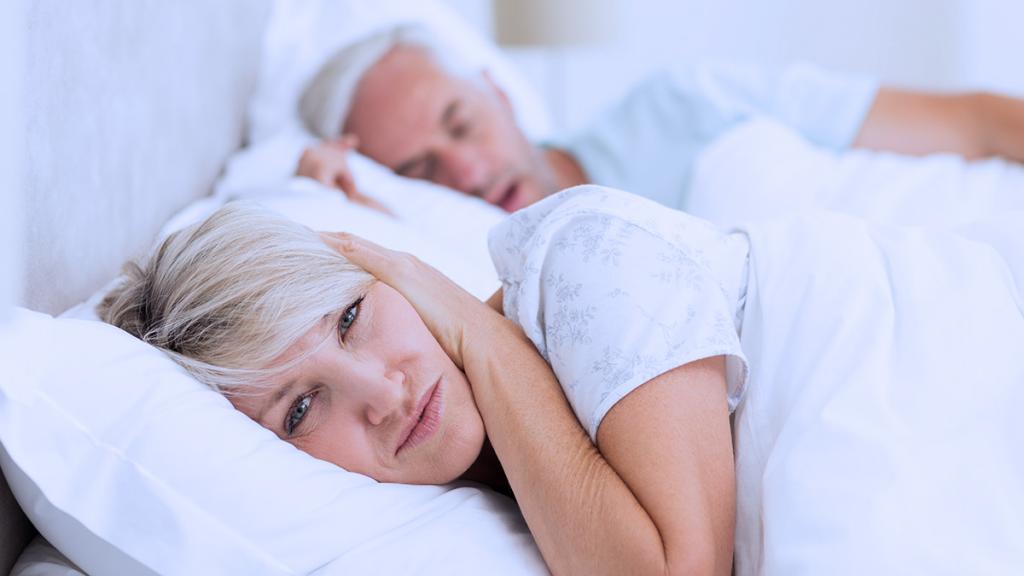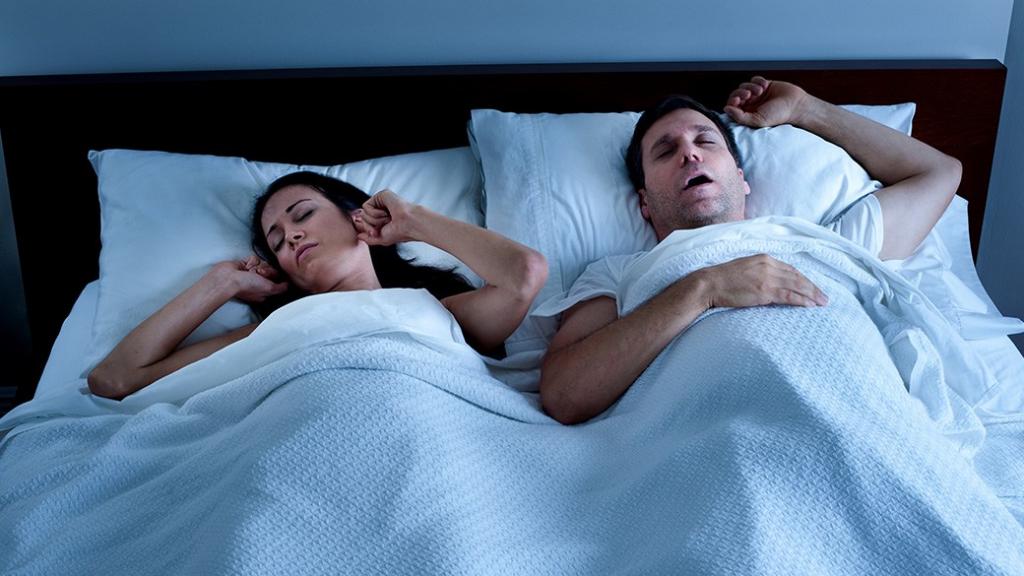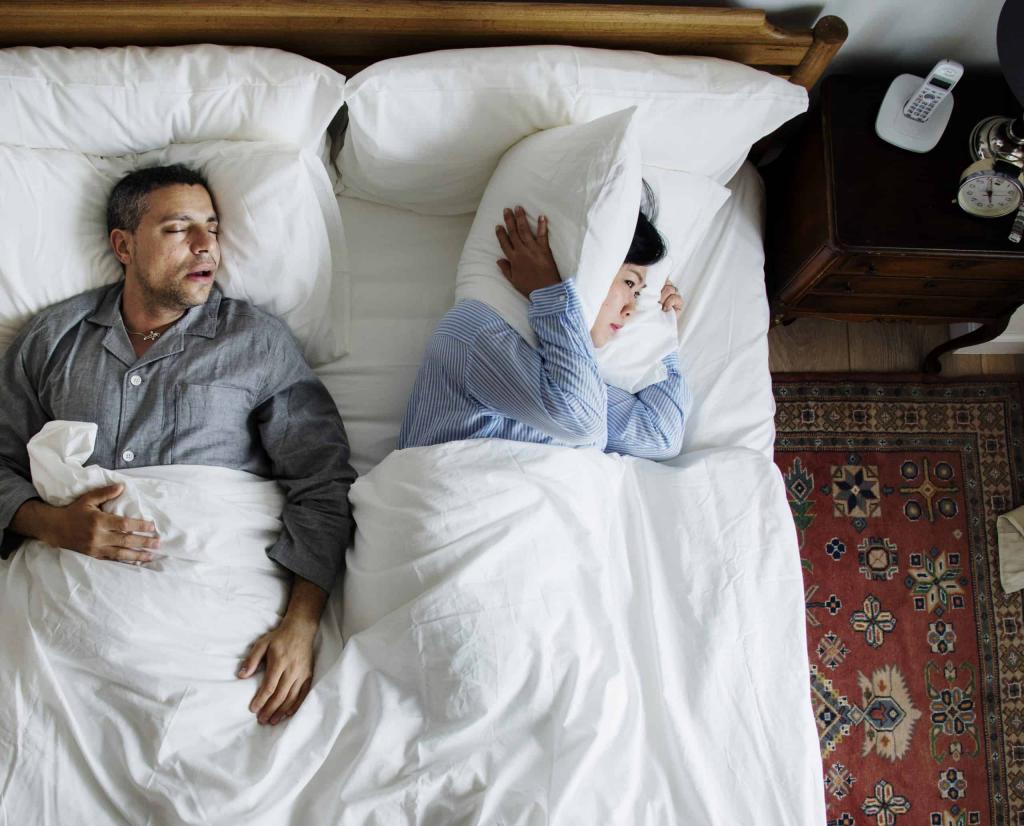Snort. Wheeze. Roar. If someone in your bedroom snores, there’s no ignoring it.
Snoring can be irritating to loved ones trying to catch some ZZZs. But it can also be a sign of obstructive sleep apnea, a potentially serious condition that causes repeated pauses in breathing during the night.
“Snoring and apnea often go hand in hand,” says ear, nose and throat physician Tony Reisman, MD. He explains why it’s important to root out the cause of your snoring — and how to squash the problem so that everyone can get some rest.
What causes snoring?
Anyone — men, women, even children — can snore. “Snoring is actually quite common in kids,” Dr. Reisman says. But it tends to be more common in men and people who are overweight. And it often gets worse as you get older.

Snoring happens when breathing is blocked during sleep. As air tries to push through the soft tissues, they vibrate — causing the telltale honks and snorts that make your significant other threaten to banish you from the bedroom.
Some people are just natural-born snorers. But often, snoring is caused by an underlying condition, such as:
- Obesity.
- Structural problems in the nose, like a deviated septum.
- Enlarged tonsils or adenoids.
- Chronic congestion and stuffiness.
Snoring and sleep apnea
Snoring by itself isn’t harmful. But it can be a sign of obstructive sleep apnea. This sleep disorder causes you to stop breathing for a few seconds at a time, over and over, night after night.
If you have sleep apnea, you likely wake up after a night’s sleep still feeling tired. You might be drowsy during the day and have trouble concentrating at work or school. Some people nod off during the day, increasing the risk of car crashes or work-related accidents.
For people with sleep apnea, treating snoring is a matter of health. If left untreated, sleep apnea can lead to serious health problems, including:
- High blood pressure.
- Stroke.
- Diabetes.
- Heart problems, including heart failure and heart attacks.
Make Bedtime Adjustments
Many sleepers can reduce or eliminate their snoring by making one or more simple adjustments at night.
Sleep on Your Side
Your likelihood of snoring depends on what position you sleep in. People are more likely to snore when sleeping on their backs, also called the supine position. In contrast, people snore less when they sleep on their sides, also called a lateral position. The tendency to snore could be more due to head position than body position, with people snoring less when their heads are turned to the side.
If you know that you’re snoring at night and you generally sleep on your back, try to fall asleep on your side instead. If you have trouble retraining your sleep position habits, consider strategically using pillows to provide comfort and keep your body and head in a side position.
Wear a Nasal Strip or Dilator
Internal and external nasal dilators are geared toward improving airflow as you sleep. As a result, they may reduce snoring. These small devices are available over-the-counter online and in most drug stores for relatively low prices.
Both types of nasal dilators are small, flexible strips that use tension to open the nasal passages. A nasal strip, or external dilator, sticks to the outside of the nose with adhesive. As it tries to retain its shape, it pulls outward, lifting skin on the nose and opening the nasal passages. An internal nasal dilator operates similarly, but from the inside. Instead of pulling on the outside of the nose, it pushes outward. Studies show that both types of dilators reduce snoring, but internal dilators tend to be more effective.
Use an Anti-Snoring Mouthpiece
A variety of dental devices are available to ease snoring. These anti-snoring mouthpieces can take more getting used to than nasal strips since they are larger and sit in the mouth all night. Anti-snoring mouthpieces are a form of mouthguard sold over-the-counter, and they generally come in two varieties.
Mandibular advancement devices — often called MADs — are a common type of anti-snoring mouthpiece. These mouthguards are usually molded to fit your teeth, then adjusted so that they move your lower jaw forward. This minor jaw realignment helps reduce snoring.

A tongue retaining device or tongue stabilizing device — often called a TRD or TSD — is another type of anti-snoring mouthpiece. Like a MAD, this mouthpiece also fits between the teeth. However, instead of adjusting the lower jaw, it holds the tongue in place. A small part of the mouthpiece uses suction to keep the tongue from falling back into the throat. In one study, a tongue retaining device reduced snoring intensity by 68%.
Besides reducing snoring, anti-snoring dental devices can even positively impact mild to moderate obstructive sleep apnea. Sleepers shouldn’t self-diagnose or self-treat sleep apnea, however. Only use a dental device for sleep apnea with the approval of your doctor.
Make Lifestyle Changes
Some people try sleeping on their side and wearing a nasal dilator or anti-snoring mouthpiece, yet still find themselves snoring. If that’s true for you, it might be time to consider making more significant lifestyle changes.
Reduce Body Weight
Experts recommend weight loss as one of the first and most important treatments to try for snoring. Of course, this recommendation only applies to people who are overweight or obese. The National Heart, Lung, and Blood Institute provides an easy-to-use chart to help you determine whether or not you have a healthy weight based on your height, weight, and waistline.
If, like nearly 74% of Americans, you are overweight or obese, consider reducing your body weight. People with obesity are more likely to snore and to develop obstructive sleep apnea. Research has found that weight loss in people with a high body mass index reduces both snoring and obstructive sleep apnea symptoms.
Be sure to approach weight loss in a healthy way. Crash diets rarely work long-term and can be dangerous. Instead, follow the Centers for Disease Control suggestions for eating a healthy diet and incorporating physical activity into your life in a positive way.
Try Mouth Exercises
In addition to exercising generally, consider mouth exercises to stop snoring. Clinically, these exercises are known as oropharyngeal exercises, and they’ve been found to effectively reduce snoring.
Mouth exercises involve repeatedly moving your tongue and parts of your mouth in ways that strengthen muscles in the tongue, soft palate, and throat. In one study, three months of mouth exercises led to a 59% reduction in snoring.
Quit Smoking
Smoking cigarettes is associated with increased snoring. The flip side is also true: quitting smoking can help with your snoring problem. Additionally, children of parents who smoke tend to snore more. If you smoke and notice snoring in your children, quitting smoking could potentially help them stop snoring as well.
Of course, snoring is one of the more minor problems caused by smoking cigarettes. Cigarettes cause nearly one-third of coronary heart disease deaths and 90% of lung cancer cases in the U.S., in addition to taking an average of 10 years off the lifespan of each smoker.
Avoid Alcohol Before Bed
Not only does alcohol increase snoring, but drinking before bed can even induce obstructive sleep apnea in people who don’t have the disorder. Alcohol’s effect on snoring and sleep is dose-related, so if you tend to drink multiple drinks, start by cutting back. If that doesn’t reduce your snoring, try to stop drinking a few hours before bed or consider cutting out alcohol altogether.
Home remedies for snoring: How to stop snoring naturally
There are several ways to address snoring, depending on what’s causing it. Some at-home remedies include:
Work toward a healthy weight
“Extra weight is one of the primary causes of snoring in both children and adults,” Dr. Reisman says. During sleep, fatty tissue in the neck can press on the throat, blocking the airways when the throat muscles relax. Losing weight can literally take the pressure off.
Relieve stuffiness
In people with chronic nasal congestion, medications like antihistamines or steroid nasal sprays can help you breathe easy — and turn down the dial on the nighttime noise.
Change your position
Try propping up the head of your bed. And snoozing on your side instead of your back may also cause less snoring. (Weird but true: Some people swear by sewing a tennis ball to the back of their shirt to keep them from rolling onto their back at night.)
Open your nose
Opening your nasal passages at night can help cut down on snoring. Adhesive nasal strips placed on the bridge of the nose lift your nostrils open to improve airflow. Another option is nasal dilators, which you insert into the nostrils to expand the nasal opening. Both strips and dilators are inexpensive and easy to find at the drugstore.
Doctor-approved ways to stop snoring
If tennis balls and nasal strips don’t do the trick — or if you have symptoms of sleep apnea — talk to your doctor about these proven remedies that address both snoring and apnea:
Embrace the CPAP
Continuous positive airway pressure (CPAP) is considered the gold standard treatment for sleep apnea and snoring. You wear a mask over your nose or mouth that blows air into your airways while you sleep. The pressurized air keeps your airways open while you doze.
In the past, the devices were bulky and uncomfortable and had a less-than-stellar reputation. But they’ve come a long way, Dr. Reisman says. “Today’s machines are streamlined, small and quiet, with different attachments to make them comfortable,” he says. “It can take a little time to get used to it, but it solves the snoring and sleep apnea problem immediately.”
Get fitted for an oral appliance
If a CPAP doesn’t agree with you, an oral appliance can bring you snoring relief. These mouthguard-style devices hold the lower jaw forward while you sleep — a posture that helps the airway stay open.
Though some over-the-counter varieties are available, Dr. Reisman recommends going to a dentist or oral surgeon for an appliance customized for your mouth. “A badly fitting appliance can strain the jaw and trade one problem for another,” he says.

Consider surgery
Depending on the cause of your snoring, surgery can help. Procedures include:
- Deviated septum repair: The septum is the bone and cartilage between the nostrils. Sometimes, it’s crooked. “When this happens, it can block airflow on one side of the nose,” Dr. Reisman says. “Correcting the deviated septum with surgery can improve snoring.”
- Turbinate reduction: “Inside your nose are structures called turbinates, which warm, clean and humidify the air you breathe,” Dr. Reisman says. They also can become enlarged. Surgery to reduce the turbinates can improve airflow and cut down on snores.
- Tonsil and adenoid removal: Tonsils and adenoids are bulky tissue in the back of the throat and nose which can cause airway obstruction and lead to snoring — especially in children. Removing them can help.
- Uvula/palate surgery: A large uvula — the soft tissue that dangles from the edge of the soft palate — can lead to snoring. “Surgery to remove the uvula and/or a portion of the soft palate can improve snoring and apnea,” Dr. Reisman explains.
- Implantable nerve stimulator: This treatment involves surgery to place an implant alongside nerves in the throat. Surgeons implant a pacemaker-like device into the chest. The device monitors your breathing and stimulates the throat muscles to open the airways, preventing apnea.

![Top Rated CPAP Machine Buyer’s Guide [current_date format=’m/Y’]](https://bestpillowsleepers.com/wp-content/uploads/2023/03/best-cpap-machine-img_6405d72310053-400x300.jpg)
![The 11 Best Cooling Weighted Blankets [current_date format=’m/Y’]](https://bestpillowsleepers.com/wp-content/uploads/2023/01/best-cooling-weighted-blankets-img_63d4ff15c615d-400x300.jpg)
![Ultimate Guide to Choosing a Best Cooling Mattress Pads [current_date format=’m/Y’]](https://bestpillowsleepers.com/wp-content/uploads/2023/01/best-cooling-mattress-pads-img_63c403115126b-400x300.jpg)
![Ultimate Guide to Choosing a Best Cooling Mattress [current_date format=’m/Y’]](https://bestpillowsleepers.com/wp-content/uploads/2023/01/ultimate-guide-to-choosing-a-best-cooling-mattress-img_63bcdba870d77-400x300.jpg)
![Ultimate Guide to Choosing a Best Cooling Comforters [current_date format=’m/Y’]](https://bestpillowsleepers.com/wp-content/uploads/2023/01/ultimate-guide-to-choosing-a-best-cooling-comforters-img_63bba2f5cd3ce-400x300.jpg)